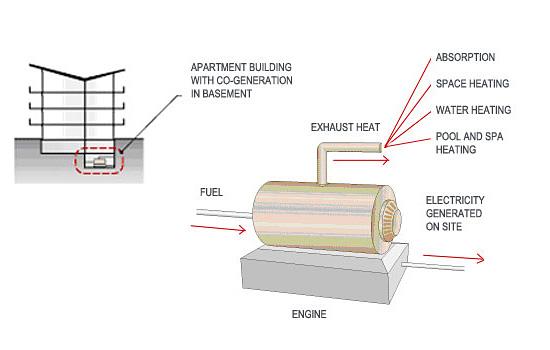Co-generation system means a system that simultaneously produces power (electrical or mechanical) and cogeneration heat (for example to heat water) from the same fuel in a single thermodynamic process.
By harnessing more energy from one generation process, cogeneration increases energy efficiency and can reduce greenhouse gas emissions when compared to other power systems. The generator can be located close to where the energy is needed, enabling local or building-based systems to control their own power.
BASIX assesses co-generation systems based on:
- Fuel that the co-generation system will use
- Electrical output of the co-generation unit in kW
- Efficiency of fuel to electricity conversion in %
Co-generation has been applied around the world in a variety of industrial and commercial settings. In some larger applications, the heat can be used for space cooling as well as for water and/or space heating (tri-generation).
In addition to proving the effectiveness of a simple cogenerated hot water supply in a multi-unit residential setting, Australian building designers and developers have been able to use the technology to provide a wider range of energy services to residential development, including low greenhouse emission air-conditioning. Tri-generation is already being considered for a number of major mixed-use development sites in Sydney.
Find out more about co-generation sizing and fuel types in relation to BASIX.
How to measure efficiency of fuel to electricity conversion
Obtain this information from the supplier of your co-generation system. As a rule of thumb, efficiency of systems generally ranges from between 20% and 45%.

Diagram showing typical set up for multi-unit co-generation system as well as energy outputs